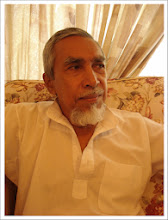1. In his letter to the Menteri Besar, my father had
described the episode that led to the writing of the request letter. I retell his
account in the letter in the following paragraphs.
2. According to my father he was asked and
persuaded by one Haji Osman bin Haji
Indot to write the letter applying for the bonuses. Haji
Osman told him “that all the non-English-speaking Malay unofficial members wanted
to ask the Government to give them bonuses in token of their services to the State
...”
3. My father explained to Haji Osman that it was
an honour to be appointed an unofficial member of the Council of State and it
was not a question of pecuniary remuneration. Haji Osman and his Malay colleagues
held that the principle that “the labourer is worthy of his hire” should be followed.
4. According to my father, Haji Osman was persistent
in his request. He went to my father’s house twice and worried him. My father told
him that they should do it by introducing a motion in the Counci1 but he refused.
5. He showed my father an article published in Utusan Melayu
dated 14th October l954 about the proposal to grant bonuses to unofficial members
of the Selangor State Council. It was debated in Council and on voting the motion
was won by those who wished to have cash bonuses.
6. Upon consulting one Che Hanafi
and explaining to him Haji Osman’s views the former said that my father should
write a 1etter for Haji Osman and his Malay colleagues. So he wrote the letter
and showed it to them on 16th December 1954 and all of them agreed to it and signed
it.
7. Subsequently, my father went on to give his
views on the matter. As regards the merits and demerits of the request letter,
he stated his affirmation thus:
“… I would like to say that the non-English-speaking Malay members are men of respect in their localities and good citizen who in the eye of the Government could perform their duties as members of Council efficiently, honestly and loyally with full patriotism as depicted in the letter addressed to the Government about their request for bonuses. The letter does not exaggerate in the least but gives a true picture of their characters, personalities and performances in Council. …”
8. He held that the non-English-speaking Malay
members were good citizens and had done their work well. In this regard he was
inclined to distinguish them from the politicians as expressed in the following
statement:
“… They are not of the type of political agitators at the various political organizations who often attack colonialism and expatriate-element of Government to agitate for quick self-government without considering the many drawbacks and obstacles which must be encountered and eliminated by many stages of wise administrative action before the goal of self-government will be fully achieved with full success and satisfaction. …”
9. My father doubted that any of the
non-English-speaking Malay members would care to introduce a motion in Council about
the matter. He stated that he himself would not like to do it. He expressed his
personal view in the concluding remark thus:
10. The Government did show its appreciation for the services rendered by the unofficial members of the State Executive Council and the Council of State. They were given souvenirs instead of cash bonuses.“… I should think that the solution of the matter could be the grant of a bonus of $250 to each member who started from the beginning of the Council. And this would settle the matter according to my personal view. …”










